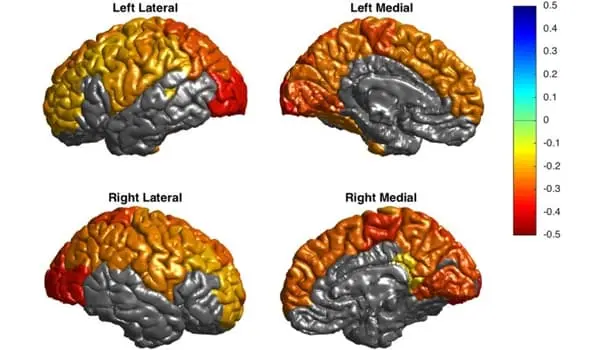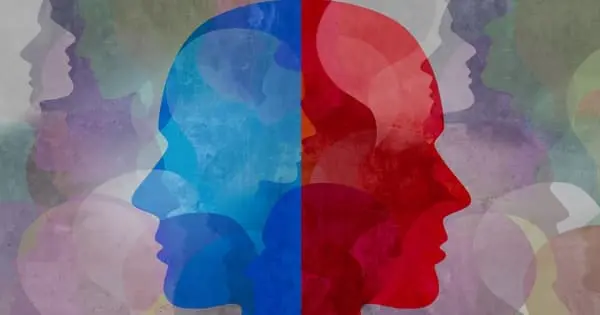Bipolar disorder (BD) is a debilitating psychiatric disorder characterized by periods of depression and mania that alternate. Scientists have long suspected that BD is associated with abnormal structural and functional changes in the brain. Small cross-sectional brain imaging studies of people with BD have revealed hints of those changes, but the ability to interpret data gathered at a single time point is limited. A multi-center longitudinal study now reveals abnormal changes in the brains of people with BD over time. Some changes were specifically linked to an increase in mania episodes.
Bipolar disorder is a mental health condition that causes mood and energy fluctuations. Symptoms of this disorder can appear at any age, but the majority of people first notice them in their late teens or early adolescence. While everyone experiences mood swings from time to time, a person with bipolar disorder experiences extreme mood swings that can impair their ability to think clearly and interfere with their daily life. A person with bipolar disorder may wonder what will happen in the future, such as whether their symptoms will worsen with age and whether they will ever be able to stop taking their medication.
The ENIGMA Bipolar Disorder Working Group report demonstrates the power of large-scale multi-center collaboration. Longitudinal neuroimaging studies are extremely difficult to carry out. We get one of the clearest pictures of the neurotoxic impact of bipolar disorder, particularly manic episodes, by combining data from 14 sites.
John Krystal
Elsevier publishes the study in Biological Psychiatry. The ENIGMA Bipolar Disorder Working Group, a large international multi-center team of more than 70 researchers, was involved in the study.
“The ENIGMA Bipolar Disorder Working Group report demonstrates the power of large-scale multi-center collaboration,” said Biological Psychiatry Editor John Krystal, MD. “Longitudinal neuroimaging studies are extremely difficult to carry out. We get one of the clearest pictures of the neurotoxic impact of bipolar disorder, particularly manic episodes, by combining data from 14 sites.”
The researchers gathered MRI and detailed clinical data from 307 people with BD and 925 healthy controls (HC) from 14 clinical sites around the world. Participants were evaluated twice, at intervals ranging from six months to nine years.
The most striking finding was that the cortex, the brain’s outermost layer, thinned more in people who had more manic episodes over time. Those who did not have mania did not have any cortical thinning or thickening. The prefrontal cortex (PFC), which is associated with executive control and emotion regulation, was the most affected.

“The finding that cortical thinning is associated with manic episodes emphasizes the importance of treatment to prevent mood episodes and is important information for psychiatrists,” said senior author Mikael Landén, MD, Ph.D., Professor and Chief Physician at the Institute of Neuroscience and Physiology, University of Gothenburg, Sweden. “Researchers should concentrate on better understanding the progressive mechanisms at work in bipolar disorder in order to improve treatment options in the long run.”
People with BD had a faster enlargement of the brain’s ventricles, which are cavities within the brain that contain cerebrospinal fluid when compared to people with HC. BD participants had slower thinning in cortical areas outside the PFC than HC participants.
“The abnormal ventricle enlargements, and importantly, the associations between cortical thinning and manic symptoms indicate that bipolar disorder may in fact be a neuro progressive disorder, which could explain the worsening of bipolar symptoms in some patients,” said lead author Christoph Abé, Ph.D., Assistant Professor at Karolinska Institutet in Sweden.
One explanation for why BD patients may have slower cortical thinning than HC is that lithium, a medication used to treat BD, is known to have neuroprotective effects and may increase cortical thickness. Regardless, the study adds to our understanding of the structural effects of BD on the brain over time.
If untreated, bipolar disorder can worsen with age or over time. As time passes, a person may have more severe and frequent episodes than when the symptoms first appeared. The longer symptoms go untreated, the more likely it is that a person will have problems with personal relationships or daily responsibilities.
Refusing to believe that treatment is still required can lead to a worsening of symptoms. If a person with bipolar disorder’s symptoms begins to improve, they may believe they are cured and attempt to stop taking their medication. This can result in a rapid return of symptoms.





